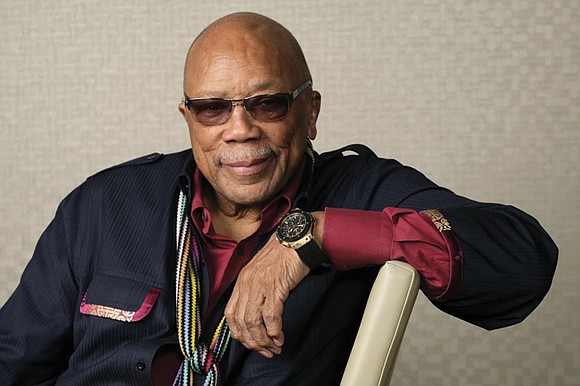Quincy Jones receives State Department’s first Peace Through Music Award
Associated Press | 9/28/2023, 6 p.m.
LOS ANGELES - Quincy Jones, who once embarked on an international diplomatic tour with jazz great Dizzy Gillespie, will receive the U.S. Department of State’s inaugural Peace Through Music Award. A ceremony honoring the 28-time Grammy winning producer, musician and arranger will be held Wednesday night and as part of the launch of the State Department’s new Global Music Diplomacy Initiative.
The award recognizes American musicians, producers, professionals and beyond who have “played an invaluable role in cross-cultural exchanges and whose music work advances peace and mutual understanding globally,” according to a press release.
Mr. Jones will receive the award from Secretary of State Antony Blinken and Recording Academy CEO Harvey Mason Jjr. at a ceremony boasting an eclectic lineup of American and international talent across generations and genres.
In 1956, Mr. Jones served as the music director and trumpeter for Mr. Gillespie and his band on the first U.S. State Department jazz tour of Southern Europe, the Middle East and South Asia. The tour was part of a Cold War program to spotlight American music and culture and counteract similar efforts by the Soviet Union.
Mr. Jones went on to become one of the biggest influences on music, producing the top-selling album of all time, Michael Jackson’s “Thriller” and “We Are the World,” and receiving Oscar nominations for the score and original song from “The Color Purple.”
The Global Music Diplomacy Initiative launch includes three key announcements: a partnership between the State Department and the Recording Academy for the American Music Mentorship Program to bring artists to the U.S. for career development opportunities (the first kicks off in Fall 2024); music-focused efforts to promote an English-language learning curriculum abroad and the Fulbright-Kennedy Center Visiting Scholar Award in Arts and Science.
“You’re going to see a long-standing partnership between the Academy and the State Department,” Mr. Mason said in an interview.
He called music the ideal tool for diplomacy.
“I just believe music has a special and unique way of bringing people’s awareness to the forefront. And it’s almost darn near magic. It’s like, we call it ‘the miracle of music.’ It has the ability to have people who may or may not even like each other, stand next to each other, and nod their head, clap their hands and sing,” he said.
“Or it has people who might come from different countries or have different beliefs, different religions — all total polar
opposite views of the way the world works — but they love their favorite artists, and they all love it just the same as the other man or woman.”
The State Department has long instituted music-based diplomacy initiatives, from President Roosevelt founding the Office of Inter-American Affairs (OIAA) in 1940 to Bruce Springsteen performing for 300,000 fans in East Berlin in 1988, the year before the wall fell, to the 2010s “Next Level,” an effort to build a global community through hip-hop.
“I’ve always had a deep love for music in part because it has the potential to connect cultures and tell the American story around the world,” Mr. Blinken told the AP.
“By launching this effort, we hope to expose a new generation of global audiences to what previous generations have found so compelling: Our people and culture. We have no more powerful tools in our diplomatic toolkit, and I look forward to seeing — and listening to — the results of this initiative.”







